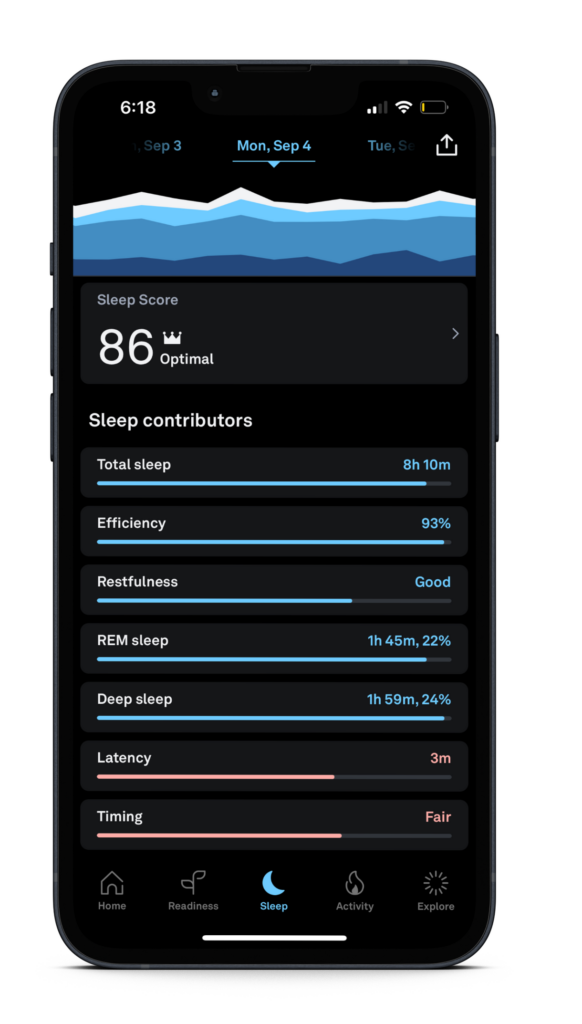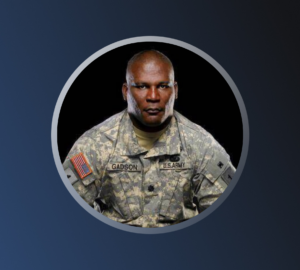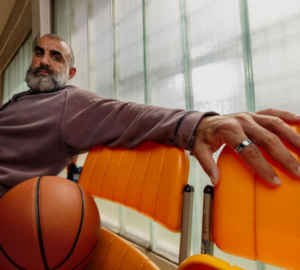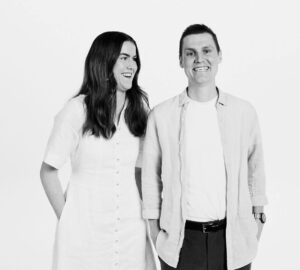Who: Linda D., 37, pharmacist, North Florida
Surprising Oura insight: Linda used to take a high-intensity exercise class after her long work shift. However, since using Oura, she’s noticed this lowers her Recovery Index (which measures the amount of sleep after your resting heart rate stabilizes during the night). Now, she opts for a lower impact sculpt or barre class to avoid elevating her heart rate before bed.
Tell us about your background. What led you to Oura?
I’ve been a pharmacist for 13 years. I work 12-hour day shifts from 9am to 9pm, with two days on and two days off. I used to work as an overnight pharmacist, with shifts lasting from 10pm until 8am. I only did this for a year, but I think that it had a severe impact on my relationship with sleep.
In April 2023, I was fortunate to participate in a clinical trial in which I received an Oura Ring. This marked the beginning of my journey with Oura.
I used to use another wearable. But I soon realized that Oura gives me much more in-depth personal insights, and more importantly, insights into my recovery. Shift work is very physically and mentally demanding, and knowing when you need to rest is vital.
How does your Oura data look as a shift worker? What strategies do you use to improve your scores?
I used to enjoy shift work because of the time off, but after using Oura, I’ve realized how hard it is on my body. It often takes me two days to recover from a shift and bring my Oura metrics back into the “Good” or “Optimal” zone.
My two favorite Oura metrics to look at are Sleep Latency (a Sleep Score contributor) and Recovery Index (a Readiness Score contributor).
Sleep Latency helps me see how exhausted — or overstimulated — I am after a shift at work. When I go to sleep immediately and my latency is low, it’s a sign I’m overtired. If my latency is too high, it’s a sign that my brain is overstimulated.

Recovery Index signifies the amount of time you’ve slept after your resting heart rate (RHR) stabilizes during the night. After a 12-hour shift, my Recovery Index is usually low. When I look at my overnight heart rate data, I notice my heart rate doesn’t drop in the first few hours of sleep, which signifies that my body is challenged. This isn’t particularly surprising – I’m standing on my feet all day, staring at a computer screen.
When I get home late at night, I try to eat something light, like a protein source, to hold me over until morning. I try to avoid carbs, as I have noticed that this can impact my sleep. I take a warm shower and read a physical book (not a Kindle!) or listen to an audiobook. I avoid all screens because my brain is already overstimulated.
I have also noticed that after a 12-hour shift, I get lower amounts of REM sleep. I tried experimenting with a few things to try and get better quality sleep, including wearing blue light glasses, which seem to have helped.
My Recovery Index and overall Readiness Score are big drivers for how I manage the days that I’m not working. If my recovery is low, I’ll give my body extra rest. If I’ve recovered well, I’ll use that day to do a long run or a HIIT class. My Oura data is my form of guided decision-making.
RELATED: How to Fall Asleep Fast & Improve Sleep Latency
Why is sleep so important for someone in your field?
I have to stand on my feet all day, which is physically draining. If I’m tired, this becomes even harder. My work is also mentally draining, so I’ve learned that sleep is number one. I’m filing medical prescriptions for people, so I need to stay laser-focused. If I’m tired or groggy, I’m not going to be thinking clearly.
I’ve learned to increase my attention span during the day by taking calculated breaks throughout my shift to mentally decompress. I typically do 2 hours of work followed by a 15-minute break.
Ultimately, being able to maintain focus usually comes down to how well I slept. When I get tired at work, I know it’s because I have overdone it the day before.
LEARN MORE: Burnout to Brilliance: How to Make the Most of Your Work Breaks
| “I used to use another wearable. But I soon realized that Oura gives me much more in-depth personal insights, and more importantly, insights into my recovery.” |
What advice would you give to someone struggling with sleep?
Patients who come into my pharmacy often ask me about my Oura Ring. Many people come in to get sleeping medications, having never had a conversation with someone about the importance of sleep hygiene. Sleep medications aren’t a long-term solution, so I take the opportunity to share some ways they can improve their sleep.
My most common tips are:
- Have a nightly wind-down routine
- Limit stimulation before bed
- Avoid heavy meals
- Avoid physically demanding activities before bed
READ MORE: How Late-Night Eating Can Impact Your Sleep
What other lessons have you learned since using Oura?
As a healthcare professional, I love the data it provides. If you’re doing shift work or have trouble sleeping, these insights can help you see what’s going wrong, so that you can make the adjustments necessary.
For example, I used to go to a HIIT class after work, but since Oura, I’ve seen that this tanks my Recovery Index. Instead, I opt for a yoga sculpt or barre class to avoid getting my heart rate super elevated before trying to fall asleep.
I’ve also adjusted my sleep hygiene: I use blackout blinds, a heavy blanket, have a strict nighttime routine, and sleep in a cool bedroom — all of which helps ensure I get 7.5 hours of sleep. With Oura, I’ve been able to isolate these variables, so I know they contribute to a better night’s sleep.
RELATED: How Meditation & Oura Helped This Entrepreneur Bounce Back from Burnout
What’s Your Oura Story?
Everyone’s story is unique, and we’d love to hear yours. Share your story here.




